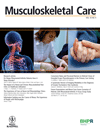Future Expectations and Worst-Case Future Scenarios of Patients with Rheumatoid Arthritis: A Focus Group Study
Abstract
Objective
Over the past 15 years, developments in the treatment of rheumatoid arthritis (RA) have resulted in better clinical outcomes. The aim of the present study was to explore how patients think their RA will influence their lives in the future, and which of these future expectations would be the worst for them to experience.
Methods
A focus group study was performed in 16 RA patients. Three groups were heterogeneously composed, based on age group (18–40, 40–65, 65–80), gender and having a paid job or not. Patients were asked about the expected future impact of RA and worst-case future scenarios. Transcripts were coded by three researchers under the main components of the International Classification of Functioning, Disability and Health. The codes were discussed until agreement was reached about all codes.
Results
Dependency on others, increasing dependency on medication, inability to walk, activity limitations and worsening fatigue were mentioned as worst-case future scenarios. Further concerns were raised about the acceptance of RA and possible disappearance of physicians' expertise. Nevertheless, hope and positive feelings were expressed toward continuous medication improvements.
Conclusion
The present study provided insight into RA patients' future expectations and worst-case future scenarios. The results may be of help in the development of support interventions to put concerns and worst-case future scenarios into a realistic perspective. Furthermore, insight into patients' worst-case future scenarios could be used to improve the validity and responsiveness of the Time Trade-Off, an instrument to measure preference-based health-related quality of life. Copyright © 2012 John Wiley & Sons, Ltd.




